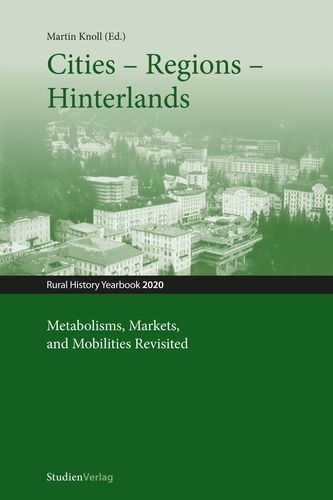- Ebook

For centuries, cities have entertained close relationships of various kinds and qualities with their – adjoining or non-contiguous – hinterlands, the latter being structured around zones of agricultural production, transport corridors such as river systems, shipping routes or railway lines, market relations, but also issues of political domination, or landownership. In the 19th and 20th centuries, the blurring and re-negotiation of city-hinterland-relations under the auspices of fossil-fueled, industrialized and globalized economies and transitions in the energy base of societies became a dominant factor. A variety of new social forms of mobility, such as intra- and interregional migration, daily commuting and tourism, strengthened and at the same time complicated the interwovenness. Taking stock of regional case studies in Austria, Denmark, and Italy, this theme issue reflects on the historically changing relations between cities and rural areas, and on the factors which let cities and their hinterlands appear as a 'region' with a distinct social ecology and with a distinct economic, social and cultural profile. Particular emphasis is to be given to the 'making' and 'unmaking' of regions, the development of market relations over time, the changing framework conditions in terms of political constitution as well as changes in land use and the urbanizing effects of tourism in peripheral regions. Seit Jahrhunderten unterhalten Städte enge und komplexe Beziehungen mit ihrem jeweiligen Hinterland. Strukturiert wurden diese Hinterländer durch Zonen der landwirtschaftlichen Produktion, Verkehrskorridore, Marktbeziehungen, aber auch durch politische Dominanz oder Grundeigentum. Im 19. und 20. Jahrhundert wurden die Stadt-Hinterland-Beziehungen unter den Vorzeichen fossilenergetischer, industrialisierter und globalisierter Ökonomien und Gesellschaften neu verhandelt. Mobilitätsformen wie Migration und Tourismus intensivierten und komplizierten das Beziehungsgefüge. Basierend auf Fallstudien zu Österreich, Dänemark und Italien untersucht das Jahrbuch die sich historisch wandelnden Beziehungen zwischen Städten und ländlichen Gebieten sowie die Produktion sozio-ökonomischer, sozial-ökologischer und kultureller Regionalität.
-
FormatoEbook
-
EstadoNuevo
-
Isbn9783706561631
-
Peso6.8 MB
-
Número de páginas196
-
IdiomaInglés
-
FormatoEPUB
-
ProtecciónDRM
-
ReferenciaBKW49281
